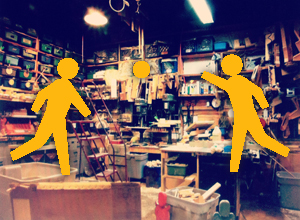Thanks to Aaron Trammell, who was scheduled to be on the “Game Studies as Media Studies” roundtable with me at the FLOW 2012 Conference, but who was unable to make it due to Hurricane Sandy, I have just learned of an exciting conference going on April 19-20, 2013 at Rutgers University (Aaron is on the organizing committee). The conference is entitled “Extending Play,” and it’s not too late to submit a proposal (but hurry, the deadline is December 1!). Here’s the CFP:
Can we still define play as an organizing principle in today’s technologically mediated world?
Play can be hard work and serious business, and it’s time to push beyond the conceptualization of play as merely the pursuit of leisure and consider how the issues of power, affect, labor, identity, and privacy surround the idea and practice of play. The Rutgers Media Studies Conference: Extending Play invites submissions that seek to understand play as a mediating practice, and how play operates at the center of all media.
We are interested in all approaches to the traditions, roles, and contexts of play, and hope to explore how play can be broadly defined and incorporated as a fundamental principle extending into far-flung and unexpected arenas. Johan Huizinga characterizes man as the species that plays: “Law and order, commerce and profit, craft and art, poetry, wisdom and science. All are rooted in the primaeval soil of play” (Homo Ludens, p.5). How does play operate as a civilizing function — or is it perhaps a technology that produces order?
Play is a means of exploring and joining various disciplines: Social media, mash-ups, and blogs have altered how we communicate and create; game design has influenced how businesses relate to consumers; citizen journalists have shifted the role of the professional in mediating information and forging a public sphere.
To explore these questions, we invite scholars, students, tinkerers, visionaries, and players to the first ever Rutgers Media Studies Conference: Extending Play, to be held April 19th and 20th, 2013 on the Rutgers University campus in New Brunswick, NJ. Confirmed speakers for our keynote conversations include Fred Turner (Stanford University) & Stephen Duncombe (New York University) and Trevor Pinch (Cornell University) & Paul D. Miller, aka DJ Spooky (The European Graduate School).
We invite individuals from media studies and related fields in the humanities and social sciences to participate. Potential topics for paper, panel, roundtable, and workshop may include, but are not limited to:
-Playing with labor: work-like games and game-like work
-Play as resistance (culture jamming, situationist art, or other contexts)
-Gendering (and gendered) play
-Music and performance
-Linguistic play
-Play and social media
-Playing with identity
-Love and play (flirtation, AI relationships, robotica, etc)
-Gamification and games in nontraditional settings
-Transgression, cheating, and “gaming” systems
-Darker side of play (trolling, gambling, or corruption)
-Game studiesThe Rutgers Media Studies Conference: Extending Play promises to offer a memorable meeting of scholarship, and to that end, we are looking to play with standard conference conventions. One track throughout the conference will be a series of public workshop sessions in which scholars and practitioners will host roundtable discussions on contemporary issues that bring together an audience of experts and interested parties. In the academic panel track, each presenter will have a maximum of 15 minutes to offer his or her ideas as a presentation or interactive conversation, and will choose one of the following methods of presentation:
–material accompaniment (hand out a zine, scrapbook, postcard series, etc)
–performance (spoken word, song, verse, dance, recording, etc)
–limited visuals (a maximum of 3 slides and 25 total words)
–game (create rules and incorporate audience play)
For additional ideas on how to play with media, play with time, or play with space during your presentation, visit our Style Guide.The deadline for proposals is Saturday, December 1, 2012. We invite individual proposals, full panel proposals (of four members), and proposals for roundtable and workshop sessions. Please email an abstract of approximately 247 words, along with your name, affiliation, presentation method, and a short biography to mediacon@rutgers.edu. If you are interested in proposing a topic for our public workshop track, or are interested in participating in one, please indicate that as well. Notifications of acceptance will be sent out by mid-January 2013.
For more info, see the conference website: mediacon.rutgers.edu
